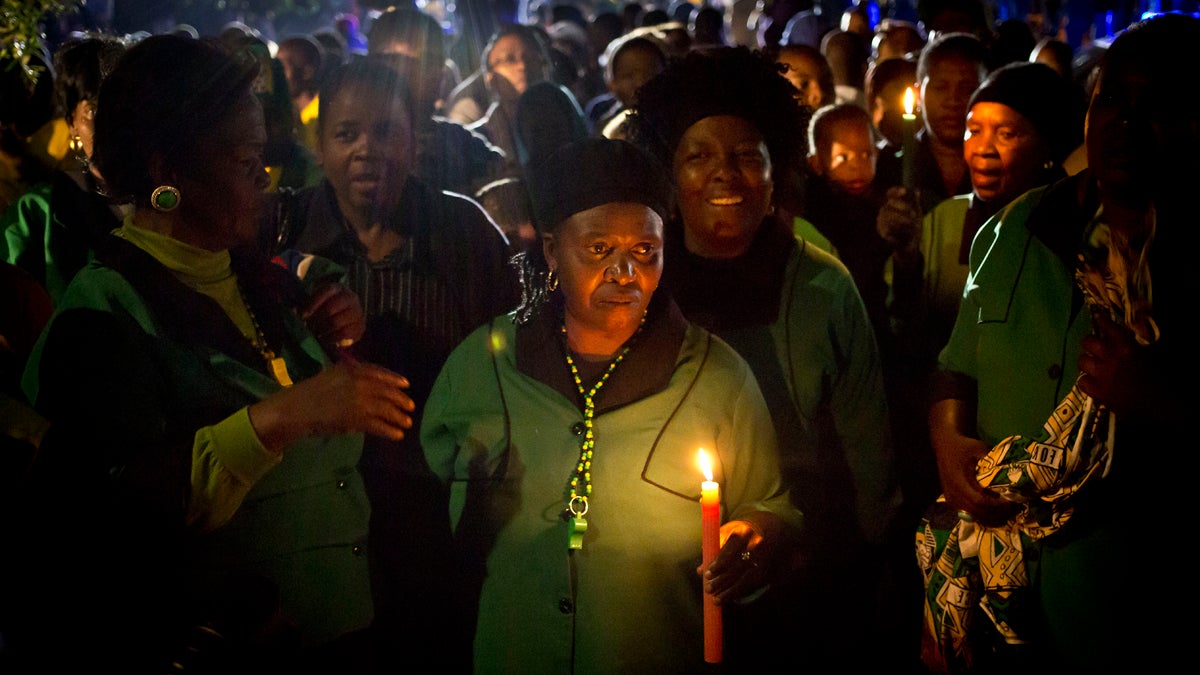A family connection to Mandela’s legacy

Members of the African National Congress Womens League hold candles and sings songs in memory of Nelson Mandela outside his old house in Soweto, Johannesburg, South Africa on Friday. (AP Photo/Ben Curtis)
My father-in-law, Josiah Matshikete Mabaso, remembers a night in Pimville, South Africa, in 1975, when an angry pounding at the door woke him and his wife at four in the morning.
My mother-in-law, Anita, dashed to the wardrobe and hid herself inside it. Josiah, determined to stay calm, opened the door to the police officers.
“Where’s your permit?” they demanded.
Earlier that year, Mama and Papa, as I’d know them decades later, had taken the risk of renting a room in the town a few miles west of Johannesburg without the residence permit that all black South Africans were required to obtain when they moved. At the time, Papa told me, those permits cost R2.50 per year — more than many black families could afford.
Under South Africa’s Apartheid regime, any black citizens who wanted to move beyond their designated township were required to carry a passbook, known as a dom pas, that authorized their presence in the area. In Afrikaans, my husband of six years said, dom means “dumb” or “fool.”
Papa showed me his old passbooks once and explained the system to me. Anyone white could ask for your dom pas at any time. If you didn’t have it, you were arrested. Before the late ’80s, if the city you were in didn’t match the city stamp on your dom pas, you were arrested. If you were in town for a job, you were required to get a monthly dom pas signature from your employer. If the signature was made in the wrong page, you were arrested. If the signature was not made before seventh day of the month, you were arrested.
“Where is your wife?” the Afrikaner police demanded that morning in 1975.
Papa said he didn’t know where she was, and the officers didn’t think to look inside the wardrobe. Mama listened to them arrest her husband and take him away in the police car. She hid until everything was quiet again, and then — “I went to work,” she said.
What else could she have done? Phones were scarce. She couldn’t ask the neighbors for help — clearly, someone had reported them to the police, but she didn’t know who. If she went to the police station to ask where her husband was, the mother of three would have been immediately arrested as well. Ten rands was the usual fee for bail.
“At that time, 10 rands was scarce,” Papa told me.
Shaking the tree
For 30-somethings like me, the American Civil Rights movement and its great 20th-century leaders seem to speak to us from history. But when my husband and I visited Johannesburg’s Apartheid Museum, and I stood slack-jawed in front of a massive casspir tank that Apartheid-era police had used to patrol black townships, my husband shrugged. He had seen enough of them in the streets while walking to school in the 1980s, when violence and mass protests against South Africa’s apartheid regime roiled the black townships surrounding Johannesburg.
When Nelson Mandela walked out of Victor Verster Prison in 1990, my husband was seven years old. He’s actually in Johannesburg right now, observing the traditional one-year anniversary of his mom’s passing, since we lost her late last November. He texted me from his parents’ house in Soweto when news of Mandela’s death broke.
He snapped images of the live local TV newscast, where people were already gathering at Mandela’s home in a nearby suburb of Johannesburg to sing. “People in pajamas and all,” he wrote.
“Nelson” is the name the iconic South African president got from a primary school teacher who was required to give her students “Christian” names. A Thembu man, Mandela’s given name was Rolihlahla, which means “troublemaker.” Or, as an Apartheid Museum exhibit on his life explained in 2011, “one who shakes the branches of the tree.”
Mandela’s death leaves me with the rapt, peculiar, engrossing sense of witnessing something with enormous historic impact which is also a simple fact of the moment.
“Think about it,” my husband wrote after sharing the news. “You and I lived at the same time with someone that influenced history itself.”
Caught up in history
Back in the 1970s, when Mandela was still on Robben Island following his 1964 conviction and life sentence for “sabotage,” Papa didn’t know he was caught up in that history.
All Mama could do was wonder and wait after the police hauled him away in 1975. Papa came back to their room the next night, unharmed. He had been questioned, and then the judge had released him with strict orders not to tell any of his neighbors how leniently he had been treated.
That wasn’t the only time Papa ended up in jail. The following year, when his employer moved his work site from one town to another without updating his dom pas, Papa was arrested in the street and had to wait behind bars until his boss would vouch for him.
I asked Papa if, at that time, he would have predicted the end of Apartheid. “I didn’t think it would ever be different,” he said.But thanks in part to one legendary person, my father-in-law was wrong. Hamba kahle, Madiba.
WHYY is your source for fact-based, in-depth journalism and information. As a nonprofit organization, we rely on financial support from readers like you. Please give today.

